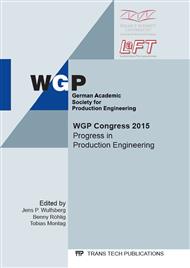[1]
G. Schuh, M. Lenders, C. Nussbaum, D. Kupke, Design for Changeability, in: H.A. ElMaraghy (Ed. ), Changeable and Reconfigurable Manufacturing Systems, Springer, Berlin, 2009, pp.251-266.
DOI: 10.1007/978-1-84882-067-8_14
Google Scholar
[2]
E. Abele, G. Reinhart, Zukunft der Produktion – Herausforderungen, Forschungsfelder, Chancen, Hanser, München, (2011).
DOI: 10.3139/9783446428058
Google Scholar
[3]
T. Bauernhansl, Industrie 4. 0, wt Werkstatttechnik online 3 (2015) 78.
Google Scholar
[4]
T. Bauernhansl, M. ten Hompel, B. Vogel-Heuser, Industrie 4. 0 in Produktion, Automatisierung und Logistik, Springer, Berlin, (2014).
DOI: 10.1007/978-3-662-45537-1
Google Scholar
[5]
B. Scholz-Reiter, C. de Beer, M. Freitag, T. Hamann, H. Rekersbrink, J.T. Tervo, Dynamik logistischer Systeme, in: S.B. Miles et al. (Eds. ), Beiträge zu einer Theorie der Logistik, Springer, Berlin, 2008, pp.109-138.
DOI: 10.1007/978-3-540-75642-2_6
Google Scholar
[6]
V. Marik, D. McFarlane, Industrial Adoption of Agent-Based Technologies, IEEE Intelligent Systems 20 (2005) V. 1, 27-35.
DOI: 10.1109/mis.2005.11
Google Scholar
[7]
W. Li, Y. Tu, Adaptive Production Scheduling and Control in One-Of-A-Kind Production, in: R. Righi (Ed. ), Production Scheduling, InTech, 2012, pp.113-138.
DOI: 10.5772/26771
Google Scholar
[8]
U. Teschemacher, A. Hees, G. Reinhart, Produktionsorganisation für die Herstellung kundeninnovierter Produkte, Zeitschrift für wirtschaftlichen Fabrikvertrieb 109 (2014) 16-19.
DOI: 10.3139/104.111097
Google Scholar
[9]
L. Marsh, C. Onof, Stigmergic epistemology, stigmergic cognition. Cognitive Systems Research 9 (2009) 1-2, 136-149.
DOI: 10.1016/j.cogsys.2007.06.009
Google Scholar
[10]
U. Bochum, Gewerkschaftliche Positionen in Bezug auf Industrie 4. 0, in: A. Botthof, E.A. Hartmann (Eds. ), Zukunft der Arbeit in Industrie 4. 0, Springer, Berlin, 2015, pp.31-44.
DOI: 10.1007/978-3-662-45915-7_4
Google Scholar
[11]
M. Veigt, F. Ganji, E.M. Kluge, B. Scholz-Reiter, Autonomous Control in Production Planning and Control: How to Integrate Autonomous Control into Existing Production and Control Structures, in: M. Hülsmann, B. Scholz-Reiter, K. Windt (Eds. ), Autonomous Cooperation and Control in Logistics, Springer, Berlin, 2011, pp.313-329.
DOI: 10.1007/978-3-642-19469-6_22
Google Scholar
[12]
G. Grote, Menschliche Kontrolle über technische Systeme – Ein irreführendes Postulat, in K. Karrer, B. Gauss & C. Steffens (Eds. ), Beiträge der Forschung zur Mensch-Maschine-Systemtechnik aus Forschung und Praxis, Symposium, Düsseldorf, 2005, pp.65-78.
Google Scholar
[13]
W. Dorst, Fabrik- und Produktionsprozesse der Industrie 4. 0 im Jahr 2020, IM Information Management and Consulting 3 (2012) 34-37.
Google Scholar
[14]
M. Reinecke, Gute Arbeit in der Industrie 4. 0 – aus Sicht der Landtechnik, in: A. Botthof, E.A. Hartmann (Eds. ), Zukunft der Arbeit in Industrie 4. 0, Springer, Berlin, 2015, pp.65-68.
DOI: 10.1007/978-3-662-45915-7_7
Google Scholar
[15]
R. Weidner, T. Redlich, J.P. Wulfsberg, Technik, die die Menschen wollen, in: Proceedings Erste Transdisziplinäre Konferenz zum Thema Technische Unterstützungssysteme, die die Menschen wirklich wollen, (2014) 1-8.
Google Scholar
[16]
Information on http: /research. google. com/university/relations/facultysummit2011/, Google Tech Talks, Self-Driving Car, presented by Andrew Chatham, on 15. 04. (2015).
Google Scholar
[17]
E. Fraedrich, B. Lenz, Automated driving – Individual and societal aspects entering the debate, submitted to TRB 93rd Annual Meeting, (2013).
Google Scholar


